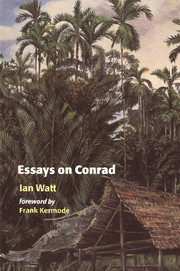Book contents
- Frontmatter
- Contents
- Foreword
- Acknowledgements
- Chapter 1 Joseph Conrad: alienation and commitment
- Chapter 2 Almayer's Folly: introduction
- Chapter 3 Conrad criticism and The Nigger of the ‘Narcissus’
- Chapter 4 Conrad's Heart of Darkness and the critics
- Chapter 5 Comedy and humour in Typhoon
- Chapter 6 The political and social background of The Secret Agent
- Chapter 7 ‘The Secret Sharer’: introduction
- Chapter 8 Conrad, James and Chance
- Chapter 9 Story and idea in Conrad's The Shadow-Line
- Chapter 10 The decline of the decline: notes on Conrad's reputation
- Chapter 11 Around Conrad's grave in the Canterbury cemetery – a retrospect
- Chapter 12 ‘The Bridge over the River Kwai’ as myth
- Index
Chapter 3 - Conrad criticism and The Nigger of the ‘Narcissus’
Published online by Cambridge University Press: 22 September 2009
- Frontmatter
- Contents
- Foreword
- Acknowledgements
- Chapter 1 Joseph Conrad: alienation and commitment
- Chapter 2 Almayer's Folly: introduction
- Chapter 3 Conrad criticism and The Nigger of the ‘Narcissus’
- Chapter 4 Conrad's Heart of Darkness and the critics
- Chapter 5 Comedy and humour in Typhoon
- Chapter 6 The political and social background of The Secret Agent
- Chapter 7 ‘The Secret Sharer’: introduction
- Chapter 8 Conrad, James and Chance
- Chapter 9 Story and idea in Conrad's The Shadow-Line
- Chapter 10 The decline of the decline: notes on Conrad's reputation
- Chapter 11 Around Conrad's grave in the Canterbury cemetery – a retrospect
- Chapter 12 ‘The Bridge over the River Kwai’ as myth
- Index
Summary
So our virtues
Lie in the interpretation of the time
Coriolanus, IV, vii, 49–50The increasing critical attention of [the 1950s] brought forth in the centenary year of Conrad's birth a tolerably heated literary controversy: Marvin Mudrick's attack on the views of – among others – Robert W. Stallman, in his ‘Conrad and the Terms of Modern Criticism’ (Hudson Review, Autumn, 1954), was answered in the Spring, 1957, issue of the Kenyon Review (‘Fiction and Its Critics …’), an answer which provoked a pretty note of injured innocence from Mudrick in the subsequent issue. Their mutual acerbities may, I think, be welcomed, if only as a reminder that Billingsgate has an ancient title to not the least attractive among the foothills of Helicon; my present concern, however, is with the ultimate grounds of their disagreement and this because it involves several problems of some importance both for Conrad and for our literary criticism in general. It also happens that Mudrick amplified his case against Conrad in the March, 1957, issue of Nineteenth-Century Fiction with an essay on The Nigger of the ‘Narcissus’, a book which was at the same time the subject of a full-scale essay in the Kenyon Review by another of the writers attacked by Mudrick, Albert J. Guerard; and since The Nigger of the ‘Narcissus’ has also received considerable attention in the last few years from a representative variety of modern critics, it would seem that our discussion can conveniently be centered on the criticism of Conrad's first masterpiece.
- Type
- Chapter
- Information
- Essays on Conrad , pp. 64 - 84Publisher: Cambridge University PressPrint publication year: 2000



